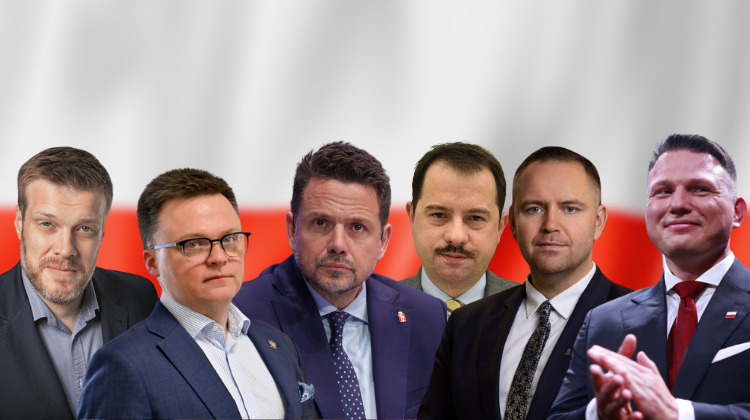Poland faces one of the most pivotal elections in its recent history. Beyond the political contest, the 2025 presidential race will determine the country’s energy and climate policy direction. Amid mounting pressure from the European Union, candidates are offering contrasting visions that will directly impact Poland’s economy, environment, and energy security.
According to the latest polls, the race is tight, with Rafał Trzaskowski leading, closely followed by conservative Karol Nawrocki and socialist Adrian Zandberg. As the energy transition becomes a central campaign issue, each candidate has clearly outlined their position on renewable energy.

Rafał Trzaskowski: Leading the Green Transition
Current Warsaw Mayor and Civic Coalition leader, Rafał Trzaskowski, champions a fast-track decarbonisation agenda. He proposes achieving 65% to 70% of electricity generation from renewable sources by 2030.
He also advocates for lifting restrictions on onshore wind energy and significantly expanding solar and offshore wind capacity. His vision aligns with Prime Minister Donald Tusk’s climate agenda, currently stalled by the presidential veto.
If elected, Trzaskowski could unlock these reforms and attract multi-billion-euro investments in green infrastructure, positioning Poland as a key player in Europe’s climate strategy.
Karol Nawrocki: Prioritising Energy Sovereignty and Nuclear Power
Conservative candidate Karol Nawrocki of the Law and Justice party focuses on achieving “total energy sovereignty”, primarily through the expansion of nuclear power and the safeguarding of national energy security.
He criticises the EU’s climate policies, calling them a “climate madness that harms Polish households and workers“. Nawrocki’s platform includes maintaining fossil fuels as a core part of Poland’s energy mix, which would likely stall the current green transition and further strain relations with Brussels.
This stance aims to protect jobs in traditional industries but distances Poland from its decarbonisation commitments.
Adrian Zandberg: A Green Transition with Social Justice
Adrian Zandberg of the Razem Party advocates a robust sustainability agenda, targeting a minimum 50% reduction in CO₂ emissions by 2030 and achieving climate neutrality by 2050.
“The transition must be fast, fair, and leave no one behind,” Zandberg declares, promoting a mix of renewables and nuclear energy with a strong focus on green job creation.
His proposals resonate particularly with younger voters disillusioned by mainstream parties, helping his platform gain significant momentum in national polls.
Sławomir Mentzen: Free Market Solutions and Climate Policy Rejection
Sławomir Mentzen, representing the far-right libertarian Confederation, rejects subsidies for renewable energy and opposes EU-imposed environmental regulations.
He promotes a free-market approach to energy policy, arguing that government intervention distorts competition. While this approach appeals to anti-establishment youth, it risks cutting Poland off from vital EU transition funds and investment opportunities critical to modernising its energy system.
Szymon Hołownia: Balancing Growth with Sustainability
Centrist Szymon Hołownia of the Third Way alliance proposes creating a National Climate Council to chart a roadmap towards climate neutrality by 2050.
Hołownia supports the development of both renewable and nuclear energy while highlighting pressing environmental challenges such as deforestation and water scarcity. His plan seeks to balance economic growth with environmental responsibility, positioning Poland as a competitive yet sustainable economy.
Artur Zawisza: Biogas and Biomethane as Immediate Solutions
Independent candidate and energy sector entrepreneur Artur Zawisza focuses on boosting biogas and biomethane as immediate solutions for Poland’s energy diversification.
Having led several industry associations, Zawisza proposes policies to incentivise biogas plant investments and the production of advanced biofuels. His technical and pragmatic profile appeals to investors looking for immediate, tangible outcomes without the ideological baggage of traditional politics.
Economic and Social Context: A PLN 1.9 Trillion Energy Transition
Poland’s energy future is not only a political issue but also a financial one. According to a report by McKinsey & Company, the country will require an investment of PLN 1.9 trillion (around €437 billion) to fully complete its energy transition by 2050.
This ambitious plan includes large-scale deployment of renewable energy, modernisation of transmission and distribution infrastructure, and the implementation of carbon capture and storage technologies. It also envisions a significant expansion of nuclear energy to ensure grid stability.
The scale of this investment highlights the challenges facing the next president, who must establish a favourable regulatory framework and secure access to critical EU funding, including the Just Transition Fund and the Recovery and Resilience Facility.
Failure to implement this roadmap could result in lost industrial competitiveness, higher energy costs for households, and a widening gap between Poland and the EU’s decarbonisation goals. In this context, the upcoming election will shape not only the country’s climate policies but also its long-term economic stability.































